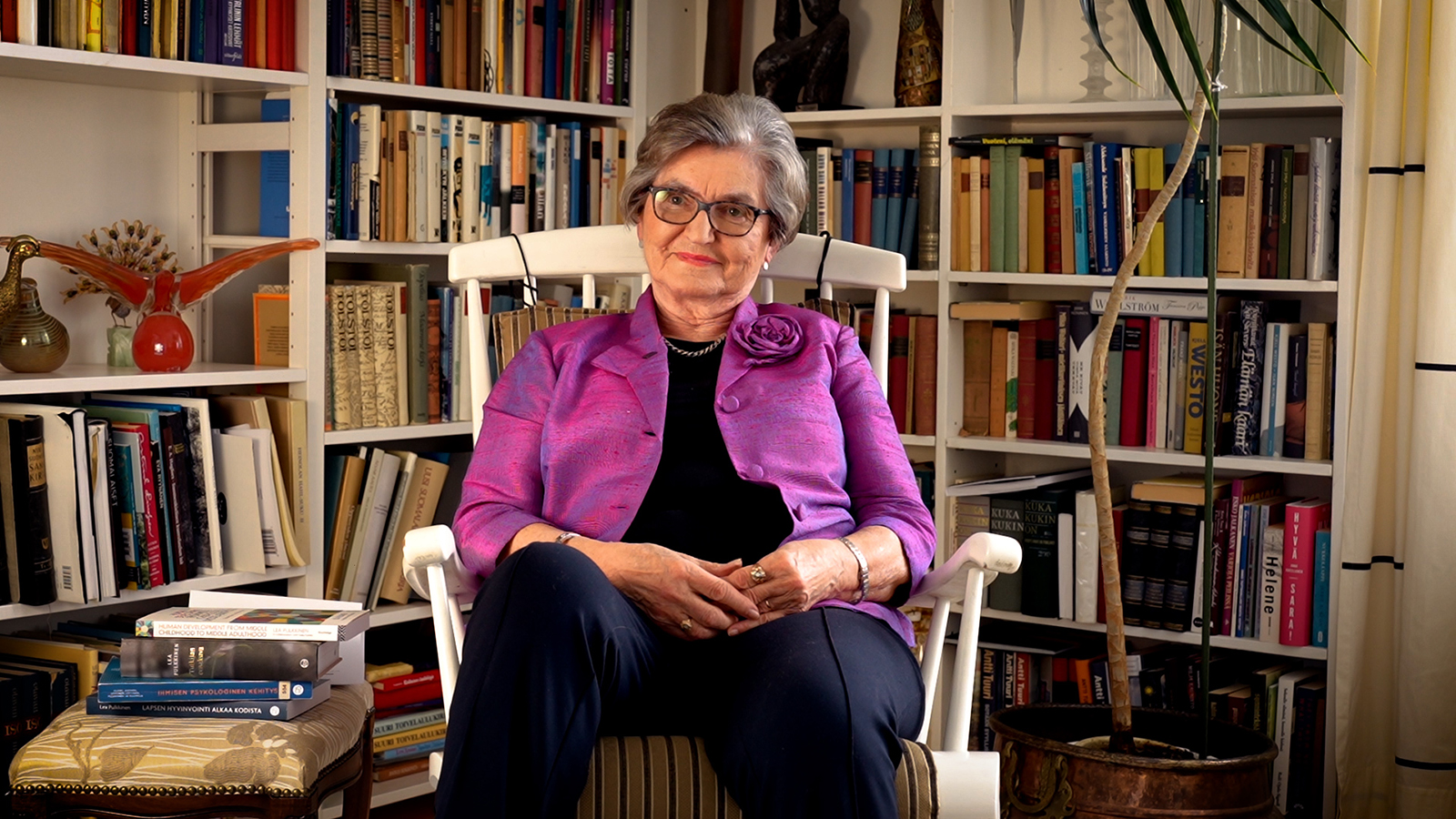The 2023 Academy Award (30 000 euros) of the Finnish Academy of Science and Letters was awarded at the Science Gala on 28 April 2023. The award was granted to Lea Pulkkinen, a professor of psychology, whose career has been distinguished. The Academy Award is an acknowledgement of lifetime achievement in sciences, and it is the most prominent recognition awarded by the Academy.
Lea Pulkkinen (b. 1939) has had an impressive international career as a professor of psychology, working mainly at the University of Jyväskylä. As a young student, she originally studied psychology as a minor subject, but Introduction to Psychology by Professor Martti Takala opened a window into scientific thinking, and she switched her major to psychology.
“Aiming to understand how we acquire information has been the most significant aspect of my career. Psychology is an empirical science that collects information from the people by listening to them and observing them. This information allows us to understand how people act and how they think. The utilization of information based on research has been a strong priority in my life.”
Pulkkinen is one of the most distinguished researchers in the field of development psychology in Europe and has made Finnish psychology research more international. Pulkkinen’s doctoral dissertation in 1968 launched a unique and still ongoing longitudinal study of the growth and development of children into adulthood. In the late 1960s, and long after, emotions and reason were considered as separate from each other, but Pulkkinen realized that the differences in people’s behavior could be explained by emotional regulation. The continued monitoring of the same group of people from primary school until middle age demonstrates the importance of emotional and behavioral regulation in terms of personal development in various areas, such as personality, education and working career, personal relationships, wellbeing and health, health behavior, and social adaptation. The study is known internationally as the Jyväskylä Longitudinal Study of Personality and Social Development (JYLS). Pulkkinen is grateful to her students and colleagues for their cooperation and to those who have participated in the study for donating their time to research.
Pulkkinen has worked as a visiting researcher and professor at the University of California, Berkeley, Arizona State University, the University of North Carolina at Chapel Hill, and the University of Cambridge in England. In 1991–1996, she served as the president of the International Society for the Study of Behavioural Development.
Alongside her international career as a scientist, Pulkkinen has wielded significant social influence and actively advocated for children, and she has been able to utilize the information obtained through research for the development of the society in an exemplary manner. Through multiple decades, she has been asked to weigh in on plans, decisions, and proposed legislation concerning children, and her objective has been to raise the cause of children and homes above party politics and day-to-day policy. In the 1970s, Pulkkinen participated in the planning of the educational goals for municipal daycare and raised concerns about childhood loneliness during the service cutbacks in the 1990s. In the 2000s, she headed a trial intended to develop the structure of school days toward a more integrative direction by introducing enjoyable recreational and supervised leisure activities. This resulted in the inclusion of before- and after-school activities in the Finnish Basic Education Act. In 2015, Pulkkinen was invited by the Ministry of Education and Culture to examine effective practices for flexible school days, and her work produced a list of suggestions for establishing the concept. She is delighted by the fact that an addendum on the Finnish Model for Leisure Activities was introduced to the Youth Act at the beginning of this year.
Her challenge for the future is also related to children.
“I would like to see society become more child oriented. The fact that a good childhood can carry far in life is also demonstrated by my own research. Child-orientation means that the psychological needs of children are taken into account. They need a lot of love, experiences of success, and the sense that they know what is expected of them. Love, structures, and encouragement. And the greatest of these is love.”
The internationally respected and experienced scientist sees worrying signs in our time concerning the future of Finnish science.
“We have harnessed science for practical needs and strategic guidance, which means that scientists are forced to chase grants, trying to jump from one field to another. This offers little chance of substantial Eureka moments. We need robust fundamental research. International mentoring and connections are also important, as they encourage and inspire us to innovate.”
Lea Pulkkinen
- Professor of Psychology, Academy Professor (1996–2001), head of the Centre of Excellence in Human Development and its Risk Factors (1997–2005)
- Recipient of several international acknowledgements, including The Aristotle Prize awarded by the European Federation of Psychologists’ Associations in 2003 and the Society for Research in Child Development Award for Distinguished Scientific Contributions to Child Development in 2005 in the United States
- Recipient of the Finnish Science Award in 2002, the Lifetime Achievement Award for Information Publication in 2011, and numerous other recognitions in Finland, including Woman of the Year in 1983 and Professor of the Year in 1992.
- Honorary Doctorate from the University of Joensuu in the field of education, development, and training, 2009
- Commander of the Order of the Lion of Finland, 2002
- Member of the Finnish Academy of Science and Letters since 1994, member of Academia Europaea since 1988
Academy Award of the Finnish Academy of Science and Letters
- Most prominent recognition of the Academy
- Awarded to recognize lifetime achievement in sciences
- First awarded in 1945
- The award amount is €30 000

